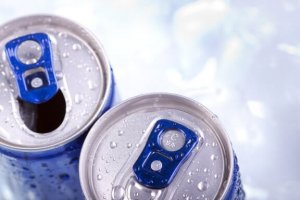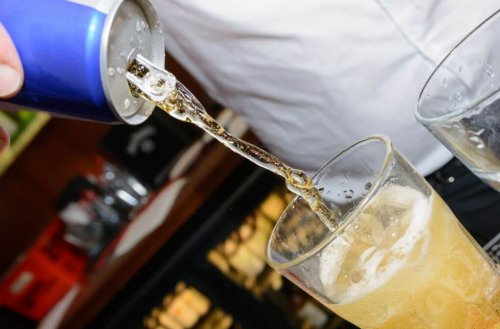Side Effects of Energy Drinks

Energy drinks have gained many followers in recent years; from athletes to people who consume them occasionally during the day to those who mix them with alcohol. This stimulus, which at first sight seems harmless, can have side effects if certain precautions aren’t taken.
People who were born in the last quarter of the 20th century will remember the enthusiasm with which energy drinks reached the market. They were presented as a miracle, capable of fighting fatigue and dehydration thanks to the salts that they contain. The product’s advertisement didn’t go beyond that context.
What do energy drinks contain?
In addition to carbohydrates, an amino acid called taurine, and sugars, the main ingredient in energy drinks is caffeine. In theory, each state must legislate on the amount of caffeine and stimulants that these drinks can contain. However, irregularities that exceed the appropriate concentrations are multiplying.
In Mexico, the National Polytechnic Institute (IPN) conducted a study on 50 energy drinks. The results: 47 of them exceeded the levels of caffeine and taurine.
Only 20 milligrams of caffeine per 100 milliliters is acceptable. According to this study, the energy drink with the highest demand in the country contains 126 milligrams.
It’s reasonable to expect side effects of energy drinks if the established parameters are surpassed. Some of these drinks comply with the regulations corresponding to their countries. Conversely, others specifically advertise them as a source of energy for daily consumption.

Side effects of energy drinks
In general, consuming an excess of caffeine and taurine can cause shaking, tachycardia, arrhythmia, nausea, anxiety, high blood pressure, headaches, insomnia, and even cardiac arrest.
Undoubtedly, the data on these energizing products depends on the individual response of each person. However, this isn’t an insignificant fact, even for people who are completely healthy.
Returning to the aforementioned Mexican study, it’s estimated that an increasingly higher percentage of the adult population opts for energy drinks. Moreover, this isn’t always a healthy decision and it depends on how many of these drinks a person ingests.
In the case of young people, experts point out how serious it is to combine high doses of caffeine and taurine with alcohol or drugs. These cocktails can have consequences that range from cardiorespiratory arrest to a euphoria that can cause a person to undermine the limits of proper judgment.
Data on the side effects of energy drinks
The Radiological Society of North America (RSNA) emphasizes the harm of increasing our heart rate by consuming energy drinks. This increase in heart rate was demonstrated following studies by the University of Bonn, Germany.
After measuring the cardiac effects in healthy young adults who ingested an energy drink, it was determined that the contractions of the heart increased after the intake. The participants of the study underwent two magnetic resonances, one before and one after drinking the product.
The problem is that this change can cause cardiac arrhythmias in people. To be more precise, an increased heart rate is capable of causing tachycardia, convulsions, and even sudden death.
The side effects that originate from energy drinks occur mostly in people between 25 and 40 years of age. According to the Administration of Substance Abuse and Mental Health Services of the United States, the number of consumers between these ages has doubled; at least between 2007 and 2011.
This means that, in these cases, adults without a history of heart problems were the ones suffering these types of urgencies due to an excess of energy drinks.

How to consume energy drinks safely
Firstly, when in doubt, consult with a doctor. People with heart problems should refrain from consuming energy drinks whenever possible. Moreover, symptoms such as insomnia, heart alterations, or irritability may be signs of high caffeine sensitivity.
In addition to all of the above, it’s important to point out that energy drinks aren’t medicine. People with “low energy” should undergo corresponding clinical studies to rule out any disorders. The chronic consumption of these soft drinks can certainly be highly counterproductive to our health.
In conclusion, reading the labels to corroborate the values of caffeine and taurine is one way to prevent stimulant shock. Children, pregnant women, and the elderly should see a doctor about the risks, side effects, and assiduity that revolve around the consumption of an energy drink.
Energy drinks have gained many followers in recent years; from athletes to people who consume them occasionally during the day to those who mix them with alcohol. This stimulus, which at first sight seems harmless, can have side effects if certain precautions aren’t taken.
People who were born in the last quarter of the 20th century will remember the enthusiasm with which energy drinks reached the market. They were presented as a miracle, capable of fighting fatigue and dehydration thanks to the salts that they contain. The product’s advertisement didn’t go beyond that context.
What do energy drinks contain?
In addition to carbohydrates, an amino acid called taurine, and sugars, the main ingredient in energy drinks is caffeine. In theory, each state must legislate on the amount of caffeine and stimulants that these drinks can contain. However, irregularities that exceed the appropriate concentrations are multiplying.
In Mexico, the National Polytechnic Institute (IPN) conducted a study on 50 energy drinks. The results: 47 of them exceeded the levels of caffeine and taurine.
Only 20 milligrams of caffeine per 100 milliliters is acceptable. According to this study, the energy drink with the highest demand in the country contains 126 milligrams.
It’s reasonable to expect side effects of energy drinks if the established parameters are surpassed. Some of these drinks comply with the regulations corresponding to their countries. Conversely, others specifically advertise them as a source of energy for daily consumption.

Side effects of energy drinks
In general, consuming an excess of caffeine and taurine can cause shaking, tachycardia, arrhythmia, nausea, anxiety, high blood pressure, headaches, insomnia, and even cardiac arrest.
Undoubtedly, the data on these energizing products depends on the individual response of each person. However, this isn’t an insignificant fact, even for people who are completely healthy.
Returning to the aforementioned Mexican study, it’s estimated that an increasingly higher percentage of the adult population opts for energy drinks. Moreover, this isn’t always a healthy decision and it depends on how many of these drinks a person ingests.
In the case of young people, experts point out how serious it is to combine high doses of caffeine and taurine with alcohol or drugs. These cocktails can have consequences that range from cardiorespiratory arrest to a euphoria that can cause a person to undermine the limits of proper judgment.
Data on the side effects of energy drinks
The Radiological Society of North America (RSNA) emphasizes the harm of increasing our heart rate by consuming energy drinks. This increase in heart rate was demonstrated following studies by the University of Bonn, Germany.
After measuring the cardiac effects in healthy young adults who ingested an energy drink, it was determined that the contractions of the heart increased after the intake. The participants of the study underwent two magnetic resonances, one before and one after drinking the product.
The problem is that this change can cause cardiac arrhythmias in people. To be more precise, an increased heart rate is capable of causing tachycardia, convulsions, and even sudden death.
The side effects that originate from energy drinks occur mostly in people between 25 and 40 years of age. According to the Administration of Substance Abuse and Mental Health Services of the United States, the number of consumers between these ages has doubled; at least between 2007 and 2011.
This means that, in these cases, adults without a history of heart problems were the ones suffering these types of urgencies due to an excess of energy drinks.

How to consume energy drinks safely
Firstly, when in doubt, consult with a doctor. People with heart problems should refrain from consuming energy drinks whenever possible. Moreover, symptoms such as insomnia, heart alterations, or irritability may be signs of high caffeine sensitivity.
In addition to all of the above, it’s important to point out that energy drinks aren’t medicine. People with “low energy” should undergo corresponding clinical studies to rule out any disorders. The chronic consumption of these soft drinks can certainly be highly counterproductive to our health.
In conclusion, reading the labels to corroborate the values of caffeine and taurine is one way to prevent stimulant shock. Children, pregnant women, and the elderly should see a doctor about the risks, side effects, and assiduity that revolve around the consumption of an energy drink.
All cited sources were thoroughly reviewed by our team to ensure their quality, reliability, currency, and validity. The bibliography of this article was considered reliable and of academic or scientific accuracy.
- Julio César Sánchez. César Ramón Romero. 2015. Bebidas energéticas, efectos beneficiosos. Extraído de: http://www.scielo.org.co/pdf/penh/v17n1/v17n1a7.pdf
- PlataformaFerya. 2017. Bebidas energizantes. Extraído de: http://www.ferya.es/wp-content/uploads/2018/01/Boletin_29-Bebidas-energizantes.pdf
- Cote M, Rangel Cx, Sánchez M, M. A. (2011). Bebidas Energizantes: ¿Hidratantes O Estimulantes? Revista de La Facultad de Medicina, 59(3), 255–266. https://doi.org/10.1016/j.comptc.2012.12.027
This text is provided for informational purposes only and does not replace consultation with a professional. If in doubt, consult your specialist.








